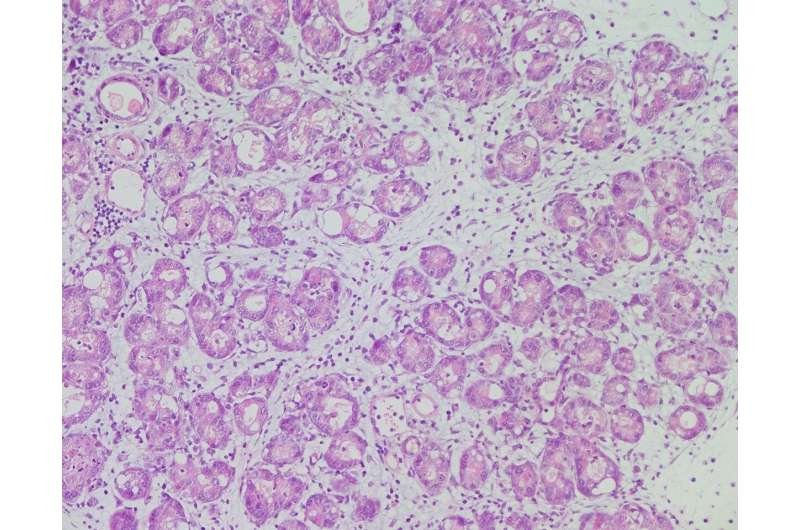This article has been reviewed according to Science X's editorial process and policies. Editors have highlighted the following attributes while ensuring the content's credibility:
fact-checked
peer-reviewed publication
trusted source
proofread
Researchers discover a molecule that helps pancreas cells mature and limits tumor formation

The pancreas, located behind the stomach, manages the energy supply in our body. It does so by secreting proteins (enzymes) responsible for glucose—the body's main fuel—that reach other organs when required and in the right amount. These proteins are produced in the acinar cells, which make up 85% of the pancreas and whose precise functioning is still under investigation.
A team led by Francisco X. Real, head of the Epithelial Carcinogenesis Group at the National Cancer Research Centre (CNIO), has found a new element related to the functioning of acinar cells and the processes involved in tumor formation in the pancreas. Their work has been published in Nature Communications, with CNIO researcher Isidoro Cobo as the lead author.
Researchers have discovered that a molecule known as NFIC is key to the proper functioning of acinar cells. This finding will help us to understand what happens when normal processes fail, and cancer or other lesions develop.
"Acinar cells are large protein factories," Real explains. "In our lab, we are interested in how they work, because when their function is disturbed, this favors tumor development. The discovery of the role played by NFIC is a further step in the understanding of how cells in the pancreas avoid alternative mechanisms to their normal functioning, which may promote the development of cancer."
Until now, it was known that NFIC participates in the formation of teeth and in the changes that occur during lactation in the mammary glands, and that it also restricts the activation of some genes that can cause certain breast tumors, but researchers were unaware that it had a function in the pancreas. This work has pinpointed its role for acinar cells to work properly at full capacity.
"The most important thing is that NFIC belongs to a family of proteins that had not been involved in the physiology of the pancreas until now," Real says.
The publication explains that if NFIC is deactivated, the acinar cells do not mature properly, and the pancreas can respond poorly to damage and become more likely to initiate tumor formation.
Pancreatic cancer is the third most fatal type of cancer in Spain (the Spanish Society of Medical Oncology registered more than 7,663 deaths in 2021). With rapid development and a high probability of metastasis, the usual treatment is surgery.
More information: Isidoro Cobo et al, NFIC regulates ribosomal biology and ER stress in pancreatic acinar cells and restrains PDAC initiation, Nature Communications (2023). DOI: 10.1038/s41467-023-39291-x



















